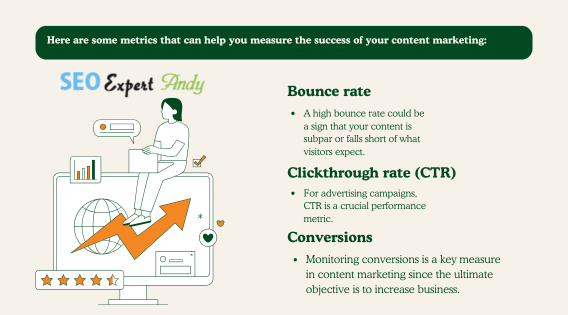The metrics of content marketing to measure content marketing ROI
In a rapidly emerging digital world, content marketing is an essential activity for enhancing brand awareness, generating leads, and engaging customers more. However, determining the effectiveness of your content strategy requires a clear understanding of content marketing metrics, which would help businesses trace the ROI and optimize future strategies.
Let’s explore the key metrics that every marketer should track to measure the success of their content marketing efforts.
1. Website Traffic Metrics
Website traffic is one of the most straightforward indicators of your content’s performance. You can gauge how well your content attracts your target audience by analyzing visitor numbers.
Key Metrics to Track:
- Page Views: The total number of pages viewed by visitors.
- Unique Visitors: The number of different visitors to your website.
- Sources of Traffic: Know where your visitors are coming from. Know if they are organic, direct, social, or referral traffic.
This will guide you in knowing which content drives the highest traffic and which channel is most effective.
2. Engagement Metrics
Engagement metrics help determine how your audience interacts with the content. High engagement means that your content relates to readers, which means better ROI.
Key Metrics to Track:
- Average Time on Page: The time that visitors spend on a particular page.
- Bounce Rate: The percentage of visitors who leave a site after viewing only one page.
- Comments and Shares: This indicates the level of interaction as well as the virality of content.
A high average time on the page combined with a low bounce rate shows your content is valuable and engaging.
3. Lead Generation Metrics
Content marketing usually generates leads that are nurtured into customers. With lead generation metrics, you’ll be able to tell how effective your content is at converting visitors into leads.
Key Metrics to Track:
- Form Submissions: Number of users who fill out contact forms or sign up for newsletters.
- Downloads: Measure gated content, such as eBooks, whitepapers, and templates.
- Click-Through Rates (CTR): The percentage of users clicking on a link, call-to-action, or email campaign.
- Monitor these metrics to help you identify the kinds of content that convert visitors to leads.
4. SEO Metrics
SEO stands to be essential for any form of content marketing strategy. Track the ways your content goes through on search engines by using SEO metrics.
Key Metrics to Track:
- Organic Traffic: The number of visitors who arrive through search engines, such as Google
- Positioning of your target keywords in search results
- Backlinks: The number of external sites that link to your content. This may indicate some level of authority and relevance. Improving these metrics can enhance the visibility of your website, thereby driving more traffic and increasing ROI.
5. Conversion Metrics
Conversions are the ultimate objective of content marketing, such as making a sale, booking a demo, or downloading an app. Conversion metrics directly tie your content efforts to revenue generation.
Key Metrics to Track:
- Conversion Rate: The percentage of visitors who complete a desired action.
- Customer Acquisition Cost (CAC): The total cost of acquiring a customer through content marketing.
- Revenue Generated: The monetary value attributed to leads generated by your content.
- These metrics make it easier to connect your content strategy with business growth in a clear and undeniably logical way.
6. Customer Retention Metrics
While acquiring customers is important, retaining them is equally important to sustain long-term ROI. The customer who remains engaged is a precious asset through the content of engagement.
Key Metrics to Track:
- CLV: The sum of revenues that a business can expect from a single customer throughout the relationship.
- Repeat Visitors: The percentage of users who return to your site.
- Subscription Renewals: For businesses offering subscriptions, this metric tracks recurring customer behavior.
- Effective retention strategies often involve creating content tailored to existing customers, such as FAQs, tutorials, or newsletters.
7. Social Media Metrics
Social media is a powerful channel for distributing content and engaging with your audience. Tracking social media metrics helps assess your content’s reach and impact.
Key Metrics to Track:
- Likes, Shares, and Comments: Engagement and shareability measure.
- Follower Growth: Measures the brand’s level of visibility and general popularity.
- Click-Through Rates: The ability of social media to facilitate traffic to your website.
- By analyzing the above metrics, you optimize your social media strategy, moving focus to the best platforms.
8. Content Performance Metrics
No piece of content performs at the same level; hence, you’ll need to identify which content performs well to ensure a maximum ROI.
Key Metrics to Measure:
- Top Content: Pages or posts with the highest number of traffic, engagement, or conversion
- Longevity: Duration or time a particular piece of content is relevant for
- Content Cost Efficiency: The ROI for individual pieces of content relative to their respective production costs
- The relevance of high-performance content will allow you to repeat success while using your resources effectively.
Also Read,
Content Consolidation: Improving Your SEO Performance
Conclusion
Measuring content marketing ROI could be important to understanding the impact of your efforts and motivating continuous improvement. Among those are website traffic, engagement, lead generation, SEO, conversions, and social media performance. That way, you would know more actionable things.
